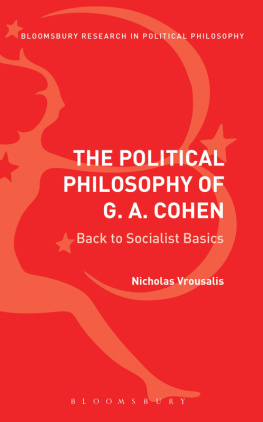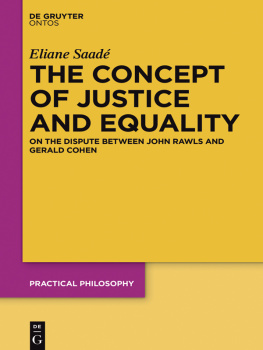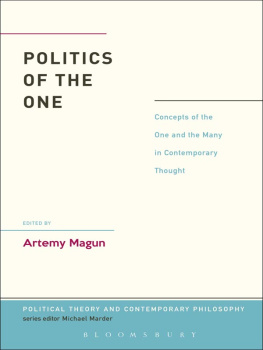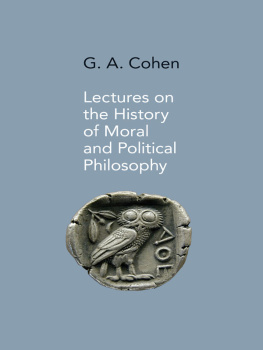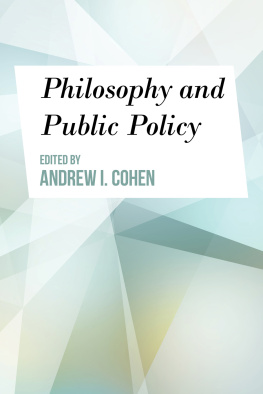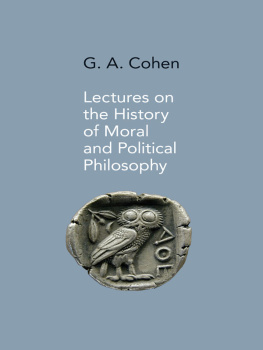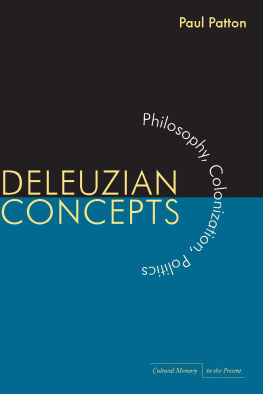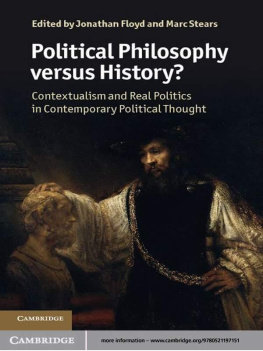The Political Philosophy of
G. A. Cohen
Bloomsbury Research in Political Philosophy
Bloomsbury Research in Political Philosophy presents cutting-edge scholarship in the field of political philosophy. Making available the latest high-quality research from an international range of scholars working on key topics and controversies in political philosophy and political science, this series is an important and stimulating resource for students and academics working in the area.
Titles include:
The Concept of Justice, Thomas Patrick Burke
Morality, Leadership, and Public Policy, Eric Thomas Weber
Nozicks Libertarian Project, Mark D. Friedman
Perfecting Justice in Rawls, Habermas and Honneth, Miriam Bankovsky
Public Reason and Political Community, Andrew Lister
Rawls, Dewey, and Constructivism, Eric Thomas Weber
Rousseau and Revolution, editors Holger Ross Lauritsen and Mikkel Thorup
The Political Philosophy of
G. A. Cohen
Back to Socialist Basics
Nicholas Vrousalis
Bloomsbury Academic
An imprint of Bloomsbury Publishing Plc

In memory of
Jerry Cohen
This book is the repayment of a debt one gladly incurred, but a debt nevertheless. I first met Jerry Cohen as a graduate student in 2003. I was an economist-aspiring-to-be-philosopher, who had come down from Cambridge to Oxford to work with Jerry. He was the famous Chichele Professor of Social and Political Theory at All Souls College, then known to me only under his philosophical nom de guerre G. A. Cohen. At first we didnt hit it off. Jerry probably thought I was too much of an economist, irreversibly steeped in confusion about normativity, preferences and agency. For my part, I initially thought Jerry was determined to demolish my every idea through analysis, just because he could. But we eventually became good friends and, by June 2009, when I defended my thesis under his supervision, we were singing happy doctorate to you in Jerrys backyard.
I am very grateful to Jerry for long and intense discussions on almost every topic of philosophical interest (and therefore on almost every topic). I also greatly miss his political companionship and sense of humour. His death in August 2009 deprived me, and many others, of a comrade and teacher. This deprivation caused me to internalize his demanding philosophical voice as a philosophical superego of sorts.
This book is the first full-length study on the unity of Jerrys thought. Throughout this study I have tried to apply Jerrys rigorous standards to his own work, as he himself relentlessly endeavoured to do. In this project I have been helped by three of Jerrys former students: James Hall, Dan Halliday and Faik Kurtulmus. They all read the entire manuscript and made incisive criticisms. Hall was kind enough to provide me with excerpts of his excellent unpublished doctoral thesis on Cohen. I am also grateful to four anonymous reviewers for helpful written comments, audiences at Cambridge, Frankfurt, Leiden, Louvain-la-Neuve and University College London, where parts of this book were presented, and Colleen Coalter at Bloomsbury for her patient encouragement from the start of this project.
I thank the following publishers and editors for permission to draw upon or reproduce materials from:
G. A. Cohens Vision of Socialism, Journal of Ethics 14 (2010): 185216. Copyright 2010 by Springer.
Jazz Bands, Camping Trips, and Decommodification: G. A. Cohen on Community, Socialist Studies 8 (2012): 141163. Copyright 2012 by Society for Socialist Studies.
G. A. Cohen on Exploitation, Politics, Philosophy and Economics 13 (2014): 151164. Copyright 2014 by Sage.
The book at hand is a critical study on the unity of Cohens political thought. Its critical aspect consists in distilling the polemical crux out of the various debates Cohen was engaged in throughout his philosophical career. Its unifying aspect consists in reconstructing these polemics such that they are presented in the most coherent light possible. The text tracks Cohens philosophical development by using certain fundamental concepts as thematic signposts. It does not presuppose any acquaintance with Cohens work and assumes only an understanding of the basics of political philosophy.
In what follows, I have resisted the temptation to offer a biographical sketch of Cohen. The reason is that others, including Cohen himself, have done this in a more informed and entertaining way than I could. In lieu of a biography, this chapter offers a broad-stroke introduction to Cohens life-animating philosophical project and the intellectual methods by which he pursued it.
Cohens theodicies
An ancient theological quandary about the existence of God asks how it is possible that an omnipotent, omniscient and omnibenevolent creature allows the existence of evil. This is sometimes called the problem of evil. A theodicy is a putative response to this problem. It is an attempt to reconcile the existence of evil with the existence of God or, more weakly, to offer an explanation that provides rational consolation for all the evil in the world, thereby making life more bearable. Theologians and philosophers through the ages have developed and defended various forms of theodicy, none of which are very compelling.
Cohens political philosophy is animated by lifelong commitment to the feasibility and desirability of a fully emancipated humanity. It offers what is, in effect, a secular egalitarian theodicy. The theodicy motif manifests itself throughout Cohens work, albeit in different forms. Before categorizing these forms, I want to summarize the four major philosophical debates that Cohen was engaged in. The first, with Louis Althusser and the Althusserians, was on the theory of history roughly, what explains what in Marxs theory of epochal change. The second debate, with Robert Nozick, was on the nature of freedom and the justifiability of capitalist private property. The third debate, with Ronald Dworkin, was on the metric of justice: if we care about equality, in what respects should we aim to make people equal? And the fourth, with John Rawls, was on the justification of incentive-seeking in the marketplace. The most obviously theodicial motif among these debates recurs in Cohens particular brand of Marxism, the subject of the opening chapter. Cohens Marxism purports to map the trajectory of unemancipated humanitys career, from the indignities of slavery and feudalism, through the capitalist vale of tears (Cohen 2008, p. 176), to the full human self-emancipation consummated by socialism. This depiction of history as a kind of primordial relay race towards freedom can be non-prosaically characterized as a form of secular theodicy. But the theodicy motif reappears, in another form, in Cohens later work. It is especially striking in the context of the third and fourth debates: Cohens commitment to the universal realization of freedom and equality survives, well after his allegiance to historical materialism has waned. Michael Rosen goes to the heart of the matter when he writes:
To the extent that Marxian socialism inherits the aspiration for the universal realization of justice in history (and Jerry [Cohen] certainly saw it that way) then the thought that Jerrys ideas about justice had religious roots seems to me obviously true. (Rosen 2010, p. 17)
A missing premiss in Rosens argument is that Cohens ideas about justice are a form of Marxian socialism. Whether or not Cohen certainly saw it that way, Marxian socialism and Cohenite socialism are different beasts. Cohen
A further methodological
Next page
